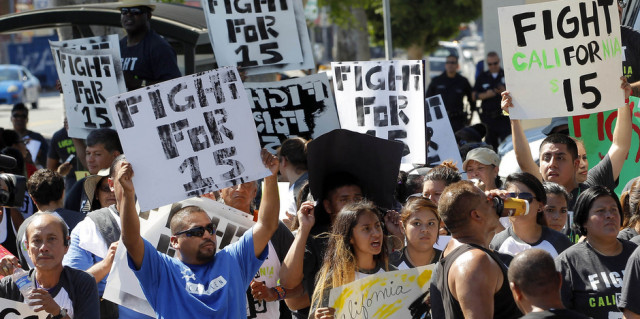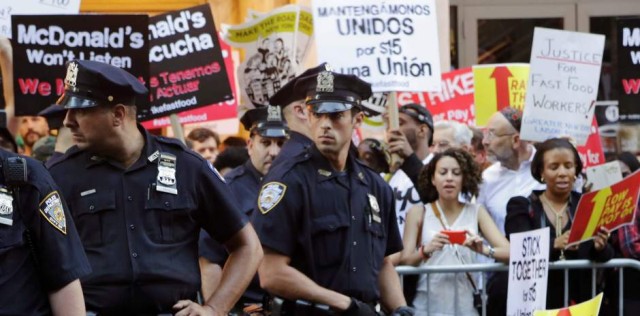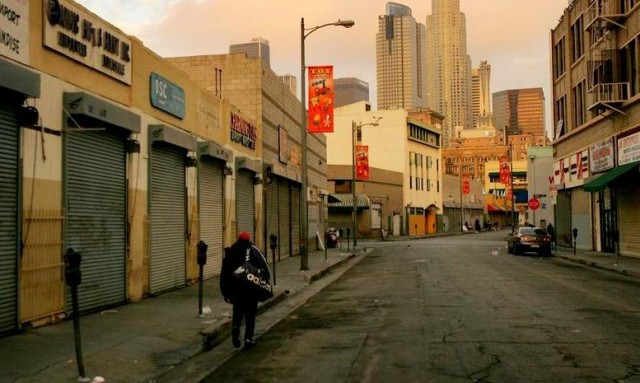Does anyone on the Los Angeles City Council have a clue about what they have just done? It really is unclear whether reality matters in this legislative body. Rarely have we seen such jaw-dropping display of economic fallacy enacted into law.
The law under consideration here is a new wage floor of $15, phased in over five years. Why phased in? Why not do it now? Why not $30 or $150? Perhaps the implied reticence here illustrates just a bit of caution. Somewhere in the recesses of the councilors’ minds, they might have a lurking sense that there will be a price to pay for this.
Such doubt is wholly justified. Recall that the minimum wage was initially conceived as a method to exclude undesirables from the workforce. The hope, back in the time when eugenics was the rage, was that a wage floor would cause the “unemployable” to stop reproducing and die out in one generation.
Racism drove the policy, but it was hardly limited to that. The exterminationist ambition applied to anyone deemed unworthy of remunerative work.
“We have not reached the stage where we can proceed to chloroform them once and for all,” lamented the progressive economist Frank Taussig in his 1911 bookPrinciples of Economics. “What are the possibilities of employing at the prescribed wages all the healthy able-bodied who apply? The persons affected by such legislation would be those in the lowest economic and social group.”
Professor Taussig spoke for a generation of ruling-class intellectuals that had egregiously immoral visions of how to use government policy. But for all their evil intentions, at least they understood the basic economics of what they were doing. They knew what a wage floor excludes marginal workers, effectively dooming them to poverty — that’s precisely why they favored them.
Today, our situation seems reversed: an abundance of good intentions and a dearth of basic economic literacy. The mayor of LA, Eric Garcetti, was elated at the decision: “We’re leading the country; we’re not going to wait for Washington to lift Americans out of poverty.”
Leading the country, maybe, but where is another question. This is a policy that will, over time, lock millions out of the workforce and forces many businesses to cut their payrolls. Machines to replace workers will come at a premium. The remaining workers will be expected to become much more productive. Potential new business will face a higher bar than ever. Many enterprises will close or move.
As for the existing unemployed, they can forget it. Seriously. In fact, it is rather interesting that in all the hooplah about this change, there’s not been one word about the existing unemployed (officially, 7.5% of the city’s workforce). It’s as if everyone intuitively knows the truth here: this law will not help them at all, at least not if they want to work in the legal economy.
The underground economy, which is already massive in Los Angeles, will grow larger. New informal enterprises will pop up everywhere, doing a cash-only business. The long, brawny arm of the state will not be powerful enough to stop it. Sneaking around and hiding from the law is already a way of life for millions. Look for this tendency to become the dominant way of work for millions more.
All of this will happen, and yet the proponents of the minimum wage will still be in denial, for their commitment to the belief that laws can make wealth is doctrinal and essentially unfalsifiable.
As for those who know better, business owners all over the city pleaded for the Council not to do this. But their pleas fell on deaf ears. The Council had already been bought and paid for by the labor unions and interests that represent the already employed in Los Angeles. Such union rolls do not include the poor, the unemployed, or even many of the 50% of workers in the city who work for less than $15. They represent the working-class bourgeoisie: people rich enough to devote themselves to politics but do not actually own or run businesses.
Will such unions be helped by this law? Perhaps, a bit — but at whose expense? Those who work outside union protection.
This is a revealing insight into why unions have been so passionate about pushing for the minimum wage at all levels. Here is the truth you won’t read in the papers: a higher wage floor helps cartelize the labor market in their favor.
You can understand this by reflecting on your own employment. Let’s say that you earn $50,000 for a task that could possibly done by others for $25,000, and those people are submitting resumes. This is your situation, and it potentially applies to a dozen people in your workplace.
Let’s say you have the opportunity to enact a new policy for the firm: no one can be hired for less than $50,000 a year. Would this policy be good for you? In a perverse way, it would. Suddenly, nobody else, no matter how deserving, could underbid you or threaten your job. It’s a cruel way to go about padding your wallet, but it might work for a time.
Now imagine pushing this policy out to an entire city or an entire country. This would create an economic structure that (however temporarily) serves the interests of the politically connected at the expense of everyone else.
It certainly would not create wealth. It would not help the poor as a whole. And it would do nothing to create a dynamic and competitive marketplace. It would institutionalize stasis and cause innovation to stall and die.
The terrible effects are many and cascading, and much of the damage will be unseen in the form of business not formed, laborers not hired, efficiencies not realized. This is what the government of Los Angeles has done. It is a self-inflicted wound, performed in the name of health and well-being.
The City Council is cheering. So are the unions. So are the ghosts of the eugenists of the past who first fantasized about a labor force populated only by the kinds of people they approved.
As for everyone else, they will face a tougher road than ever.

Jeffrey A. Tucker
Jeffrey Tucker is Director of Digital Development at FEE, CLO of the startup Liberty.me, and editor at Laissez Faire Books. Author of five books, he speaks at FEE summer seminars and other events. His latest book is Bit by Bit: How P2P Is Freeing the World.






